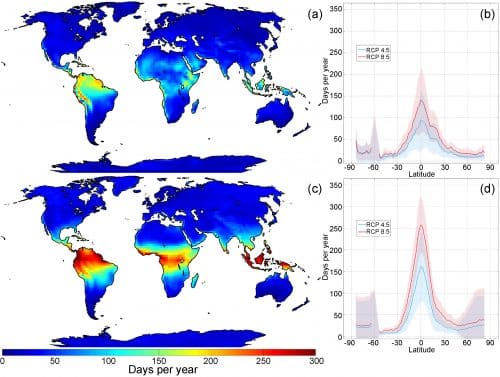Everyone is talking about global warming, but what about humidity? New research claims that as the world warms it will also become much wetter in many areas - the possible result? danger of death

By Maya Falah, Angle, Science and Environment News Agency
We all know that what is really difficult in the Israeli summer is not the heat, but the humidity. Imagine that you are walking in the streets of Tel Aviv in the months of July-August - just by thinking about it, drops of sweat will start to travel down your body. The bad news is thatAccording to a new study, it seems that it is only going to get worse: researchers from Columbia University in the United States claim that among the effects of climate change, a significant increase in humidity is also expected in many regions of the world. Other than a little more sweating, what does this really say about what's in store for us in the not-too-distant future?
According to various scenarios, by the end of the century the earth is expected to warm between 3 and 4 degrees Celsius compared to the temperatures that prevailed here before the industrial revolution. This is a warming that is significant in itself and that may affect many areas of our lives: from damage to our health and the global supply of food and drinking water, to the reduction of the areas that will be suitable for human habitation as well as damage to natural systems and many species of animals. However, until recently, not many researchers have addressed the question of moisture and what will happen to you as the Earth continues to warm. This is a fundamental question, because an increase in humidity will make the heat problematic and even dangerous for us.
Humans (and other mammals, such as apes and horses) sweat to allow the body to get rid of excess heat. When there is a lot of moisture in the air, the body has a harder time evaporating the sweat through the skin - because the air is already saturated with water. This means that without cooling from an external source, the excess heat remains in the body and may lead to phenomena such as anesthesia (for anesthesia), failures in the internal organs (eg kidney function) and in extreme cases even heat stroke and death.
Dangerous without air conditioning
According to the new study, in some parts of the world - mainly in tropical areas, but not only there - humid conditions are expected to worsen later in the century. This will happen at the same time as the temperatures rise, among other things because as the Earth warms, the atmosphere contains more water vapor - especially over the oceans. Therefore, in the already humid tropical regions even today, a further increase in the percentage of humidity is expected, and in combination with the increase in temperature, the conditions of the heat load will become unbearable and even fatal for some of the population.
High heat load conditions that today we witness once a year, at most, will become much more common in the 70s. In fact, to date, only a few cases of such high heat and humidity levels have been recorded: In 2015, about 46 degrees were measured in Bandar Mashahar in Iran with conditions of extremely high humidity that came from the Persian Gulf. This combination created a heat load that is equivalent to about 73 degrees Celsius (!).

According to the model created by the researchers, among the areas that are expected to suffer especially from such weather conditions are mainly northeast India, and the Amazon in the north of the South American continent. Other areas that are in the "line of fire" and the humidity are eastern China, the southern part of the Arabian Peninsula and also the southeastern United States.
"No human being can survive such conditions of such extreme heat and humidity," says Prof. Yoav Yair, Dean of the School of Sustainability at the Herzliya Interdisciplinary Center and an expert on climate change. "The problem is mainly with agricultural companies, and countries where significant parts of the population do not have an organized air conditioning infrastructure. This is what happened about a year and a half ago when he was Extreme heat wave In India, where it was close to 50 degrees Celsius for several days in a row: over 500 people died in the streets, simply because they did not have access to air-conditioned spaces. So the worst damage will be mainly to disadvantaged populations."
Switch to renewable energies and stay dry
Such extreme conditions of heat are expected as mentioned, to have a serious effect on considerable parts of the world's population, also from the obvious point of view - of severe health damage that may lead to the loss of many human lives; But also in areas that are less obvious: if many people do not have the ability to work outside for some days of the year, this is expected to severely damage the economy of countries, their military performance and their ability to grow food. Also, such heavy heat loads will make it very difficult for our air conditioning and temperature control systems - which will require the use of increasing amounts of energy, and of course may cause serious damage to the natural systems of the earth and the animals - they do not have the option of simply entering the house and turning on the air conditioner when the temperatures soar .
So what should we do? Are we destined to live in such extreme conditions? According to the researchers, it is possible that it is still not too late and we can avoid reaching the extreme conditions predicted in the study, even before the end of this century - that is, if we manage to slow down the warming of the earth in relation to the scenarios predicted today. within Paris Agreement The countries of the world have pledged to cut their greenhouse gas emissions, with the aim of limiting global warming to 1.5 to 2 degrees Celsius at most in relation to the values that preceded the industrial revolution; If we do manage to do this, the researchers predict that millions fewer people will be exposed each summer to such extreme conditions in the 2070s.
"We need to do everything in our power not to reach a scenario of the earth warming by more than 2 degrees", emphasizes Prof. Yair. "We must meet the goals we committed to within the framework of the Paris Agreement - that is, to reduce the emission of greenhouse gases into the atmosphere to values that will not cause further extreme warming. We need to do this, among other things, by quickly switching to the use of renewable energies - solar energy and wind energy. We need to stop this addiction of ours to fossil fuels like coal and oil, and take an example from countries like Denmark and Germany - who announced that they will completely stop using fossil fuels by 2030. It's in our hands. The government has decided on a 17 percent reduction in greenhouse gas emissions by 2030. This is not an ambitious goal, certainly not compared to other Western countries - and we must make sure, at the very least, that we succeed in meeting it."
